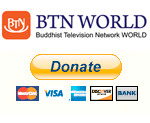
|
|
|
Home Asia Pacific North Asia S/N Korea News & Issues Anti-religious sentiments on rise in Korea after slanderous incidentsYonhap News, Oct 7, 2007SEOUL, South Korea -- Anti-religious sentiments have emerged in South Korea following a series of headline-making scandals involving religious communities.
The Jogye Order of Korean Buddhism, the largest Buddhist group in South Korea, held a meeting of the representative council of parishoners on Friday. The Jogye Order has about 2,300 affiliated temples and 13,000 monks nationwide. The meeting was called to deal with reports by the local media which, the Jogye Order claims, are undermining the Buddhist community.
"We regret that people perceive the Buddhist community as the mastermind behind the scandal involving Shin Jeong-ah. We call on the prosecutors to investigate the incident fairly and quickly to reveal what is truly going on." The incident follows public anger at the local Christian community after the kidnapping of 23 South Korean Christian aid workers in Afghanistan in July after the South Korean government warned Koreans not to enter the volatile Central Asian state ravaged by years of civil war. Most of the South Korean Christian volunteers, sponsored by a local church, were freed in August after two of them were killed by the Taliban insurgents. Critics speculated a ransom had been paid by the South Korean government to the insurgents to secure the release of the hostages. Now, public eyes are focusing on South Korea?? Buddhist community because of the Shin scandal after prosecutors alleged a Buddhist monk was involved in a fake degree scandal. Youngbae, the head monk of a Buddhist temple in Ulsan and chairman of the board of directors of the Buddhist-affiliated Dongguk University, is suspected of having played a major role in hiring the disgraced Shin accused of forging her academic degrees. Shin is suspected of forging her undergraduate and master's degrees from the University of Kansas and a doctorate from Yale University to land a job as an art history professor at Dongguk University in 2005. Based on her fake academic background, she also got a job as a co-director for South Korea's largest art exhibition, the Gwangju Biennale. Byeon Yang-kyoon, a former top presidential aide who allegedly has had an intimate relationship with Shin, is suspected of having abused his power and pressed government officials to financially support the temple Youngbae is heading, in exchange for the employment of Shin. Another Buddhist monk, Jangyun, a former member of the university's board of directors, has claimed that he was fired from the post because he opposed Shin's appointment as a professor. Meanwhile, there are also calls within the Buddhist community that the Buddhists need to reflect on themselves and change. "This turmoil was created in the first place by the worldly conflicts and unrighteousness within the South Korean Buddhist community. All the members of the board of directors of Dongguk University should make public repentance and resign," said the Buddhist Solidarity for Reform. "We propose the Buddhist leaders to form an independent, anti-corruption panel to maintain the unity and cleanliness of our community," it said in a statement. A poll conducted by a pan-religion organization, showed many South Korean religious leaders think the religious groups are too much focused on the growth. The Religious Network for the Social Reform, composed of the Buddhist, Christian and Catholic activist groups, surveyed 300 religious leaders in July. When asked what is the most urgent problem need to be changed in the religious community, 25 percent responded by saying that growing in numbers and statitics has become too important for the religion, while 17.8 percent picked the acts of exclusion between the religious communities. Corruption (12.3 percent) and immorality (11.6 percent) of the leaders followed. |
 |
|
| Korean Buddhist News from BTN (Korean Language) |
|
 |
|
|
Please help keep the Buddhist Channel going |
|
| Point
your feed reader to this location |
|

 << Monks from the Jogye Order of Korean Buddhism convening the meeting
<< Monks from the Jogye Order of Korean Buddhism convening the meeting

